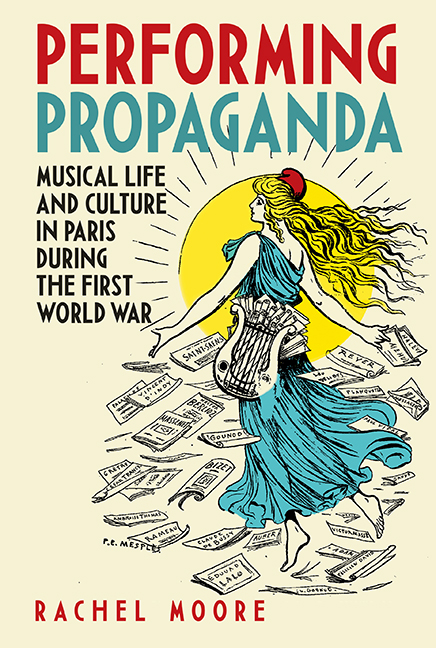 Performing Propaganda: Musical Life and Culture in Paris during the First World War
Performing Propaganda: Musical Life and Culture in Paris during the First World War Book contents
- Frontmatter
- Contents
- List of Illustrations
- List of Tables
- Acknowledgements
- List of Abbreviations
- Introduction
- 1 Musical Institutions on the Home Front
- 2 The Origins of Wartime Musical Propaganda: From the Written Word to Performing Globetrotters
- 3 Saint-Saëns's Germanophilie as a Propaganda Prototype
- 4 Propaganda on the Concert Stage: The Matinées Nationales
- 5 Creativity and Compromise at the Opéra
- 6 Music Publishing and the Édition Française de Musique Classique
- Conclusion
- Bibliography
- Index
- Miscellaneous Endmatter
3 - Saint-Saëns's Germanophilie as a Propaganda Prototype
Published online by Cambridge University Press: 19 July 2019
- Frontmatter
- Contents
- List of Illustrations
- List of Tables
- Acknowledgements
- List of Abbreviations
- Introduction
- 1 Musical Institutions on the Home Front
- 2 The Origins of Wartime Musical Propaganda: From the Written Word to Performing Globetrotters
- 3 Saint-Saëns's Germanophilie as a Propaganda Prototype
- 4 Propaganda on the Concert Stage: The Matinées Nationales
- 5 Creativity and Compromise at the Opéra
- 6 Music Publishing and the Édition Française de Musique Classique
- Conclusion
- Bibliography
- Index
- Miscellaneous Endmatter
Summary
IN SEPTEMBER 1914, one month after the outbreak of hostilities and only days after allied victory in the Battle of the Marne had prevented the central powers from taking Paris, the front page of the nationalist, right-wing periodical Écho de Paris featured the first in a series of five polemical articles by the elderly doyen of French music and academician of the Institut de France. The articles, entitled Germanophilie, were a violent attack on the domination of French artistic life by German music, especially that of Wagner. In the first, the 79-year-old Saint- Saëns lamented the ‘absurd Germanophilia’ that had dominated the French music scene for far too long and with detrimental effects on France's own musical traditions. In instalments published over the following weeks, he set about persuading his readers of the urgent need to prioritise French music over that of the enemy, calling for a ban on performances of Wagner within Parisian theatres and concert halls for the duration of the war.
Saint-Saëns's articles appeared in print shortly after French President Raymond Poincaré made an address to the members of the Institut de France, emphasising the importance of a home-front war effort in the fight against Germany and urging the academicians to use their pens and their words in defence of their country. The wartime press was an important outlet for written or ‘academic’ propaganda, which aimed to rally the nation behind the French soldiers and influence public opinion against the opposition. It was also a forum for intellectuals and academicians eager to convince the masses of the justness of the cause for which they were fighting. As Chapter Two has explored in more detail, the written word was one of the earliest forms of wartime propaganda and one which dominated the activities of many of the private organisations whose activity preceded government rationalisation. It was also largely a pursuit of the elderly, because the younger male population of France had been conscripted.
- Type
- Chapter
- Information
- Performing Propaganda: Musical Life and Culture in Paris during the First World WarMusical Life and Culture in Paris during the First World War, pp. 65 - 96Publisher: Boydell & BrewerPrint publication year: 2018


